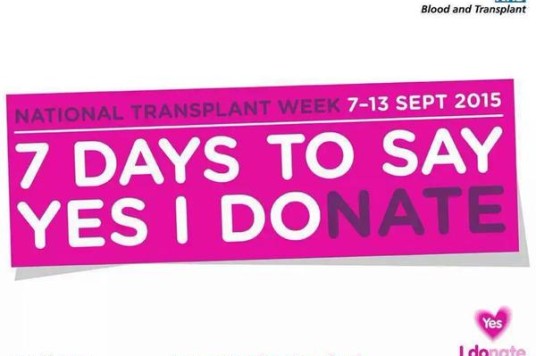St George’s gets behind the ‘Seven Days to Say Yes I Donate’ campaign
Across the UK there are 10,000 people in need of a transplant. Last year the number of people donating organs fell for the first time in 11 years. The UK also has one of the lowest rates in Europe for families consenting to organ donation and in 2014/15 only 58% agreed to donate their family members’ organs after they died.
With 16.9 million people admitting that they haven’t considered organ donation and 4.1 million people saying that they would want to donate their organs when they die, but not discussing this with their loved ones – NHS Blood and Transplant are on a mission to get us talking about organ donation.
Their ‘Seven Days to Say Yes I Donate’ campaign, part of National Transplant Week 7th – 13th September 2015, aims to break down barriers and taboos around organ donation.
Anthony Clarkson, NHS Blood and Transplant’s Assistant Director for Organ Donation and Nursing said: “Every day three people die in need of a transplant. Yet across the UK 1 in 3 adults haven’t considered organ donation or decided whether they want to be an organ donor.
“To save more lives we need more donors. To raise that number we really need everyone to understand the importance of not being complacent. We need to get to the point where organ donation is high on the list of important personal conversations we routinely have with loved ones.”
In July this year St George’s reported the highest number of organ donors in the country. Last year our consent rate was 77%, nearly 20% above the national average. We are proud of this but we know more needs to be done.
Dr Ashleigh Sherrington, Clinical Lead for Organ Donation at St George’s said, “When surveyed independently the public are largely supportive of organ donation, but often this doesn’t translate to giving consent on behalf of their loved ones.
“The staff at St George’s are strongly supportive of organ donation and are committed to providing the best care to patients and their families at the end of life. We adopt a collaborative approach to supporting our patient’s families, with embedded specialist nurses working closely with critical care staff to ensure that organ donation is discussed at a time that is appropriate for them and their circumstances.
“When approached in the right way, at the right time, more of our families choose to proceed with organ donation. By incorporating organ donation into our usual end of life care model we are able to identify any potential donors in a timely fashion.
“As a trust this means we have had more donors in the last 12 months than any other hospital in the country and have facilitated over 120 lifesaving and life changing transplants.”


